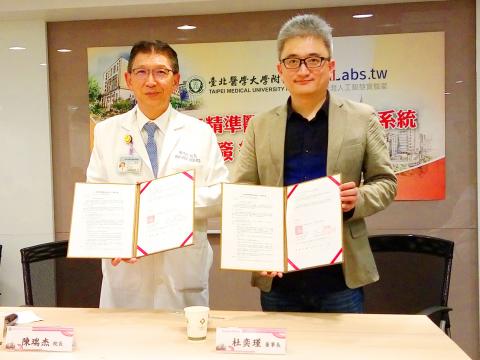Taipei Medical University Hospital on Dec. 7 signed a contract with Taiwan AI Labs to collaborate on introducing an artificial intelligence (AI) system that would provide an earlier warning for sepsis in its intensive care units (ICUs).
The five-year contract with the research organization was signed by hospital superintendent Chen Ray-jade (陳瑞杰) and Taiwan AI Labs founder Ethan Tu (杜奕瑾).
The first phase of the collaboration aims to improve the hospital’s “electronic dashboard” ICU (TED-ICU) by integrating an AI system that could automatically predict the early development of sepsis and alert the resident medical team.

Photo: Wu Liang-yi, Taipei Times
The health conditions of ICU patients can change drastically, and sepsis is a life-threatening condition that occurs in about 437 patients per 100,000 globally, Chen said, adding that studies suggest that sepsis causes about one-third of all deaths in US hospitals.
Previously, sepsis could only be detected after its onset, but after the hospital last year introduced the TED-ICU, medical teams can predict the risk of sepsis about four hours before it occurs, Chen said.
The system works by automatically collecting, integrating, analyzing and keeping a record of ICU patients’ physiological information, the hospital said.
The collaboration with Taiwan AI Labs aims to further improve the dashboard with AI, allowing a real-time alert as soon as it detects the risk of sepsis, hopefully even more than four hours in advance.
Tu said that after his mother passed away from sepsis last year, he began thinking about how to use AI to interpret real-time physiological information to reduce the sepsis mortality rate.
The lab in September developed an AI sepsis detection system and allowed it to learn from the hospital’s data for two months, Tu said, adding that so far, its detection accuracy is at about 85 percent and can hopefully enter clinical use soon.
The hospital said it hopes to introduce AI to learn the medical records of people injured in falls to develop a mechanism to predict high-risk groups for such injuries and to analyze their causes to improve care.

Costa Rica sent a group of intelligence officials to Taiwan for a short-term training program, the first time the Central American country has done so since the countries ended official diplomatic relations in 2007, a Costa Rican media outlet reported last week. Five officials from the Costa Rican Directorate of Intelligence and Security last month spent 23 days in Taipei undergoing a series of training sessions focused on national security, La Nacion reported on Friday, quoting unnamed sources. The Costa Rican government has not confirmed the report. The Chinese embassy in Costa Rica protested the news, saying in a statement issued the same

Temperatures in New Taipei City’s Sindian District (新店) climbed past 37°C yesterday, as the Central Weather Administration (CWA) issued heat alerts for 16 municipalities, warning the public of intense heat expected across Taiwan. The hottest location in Taiwan was in Sindian, where the mercury reached 37.5°C at about 2pm, according to CWA data. Taipei’s Shilin District (士林) recorded a temperature of 37.4°C at noon, Taitung County’s Jinfeng Township (金峰) at 12:50 pm logged a temperature of 37.4°C and Miaoli County’s Toufen Township (頭份) reached 36.7°C at 11:40am, the CWA said. The weather agency yesterday issued a yellow level information notice for Taipei, New

Taiwan’s Liu Ming-i, right, who also goes by the name Ray Liu, poses with a Chinese Taipei flag after winning the gold medal in the men’s physique 170cm competition at the International Fitness and Bodybuilding Federation Asian Championship in Ajman, United Arab Emirates, yesterday.

A year-long renovation of Taipei’s Bangka Park (艋舺公園) began yesterday, as city workers fenced off the site and cleared out belongings left by homeless residents who had been living there. Despite protests from displaced residents, a city official defended the government’s relocation efforts, saying transitional housing has been offered. The renovation of the park in Taipei’s Wanhua District (萬華), near Longshan Temple (龍山寺), began at 9am yesterday, as about 20 homeless people packed their belongings and left after being asked to move by city personnel. Among them was a 90-year-old woman surnamed Wang (王), who last week said that she had no plans